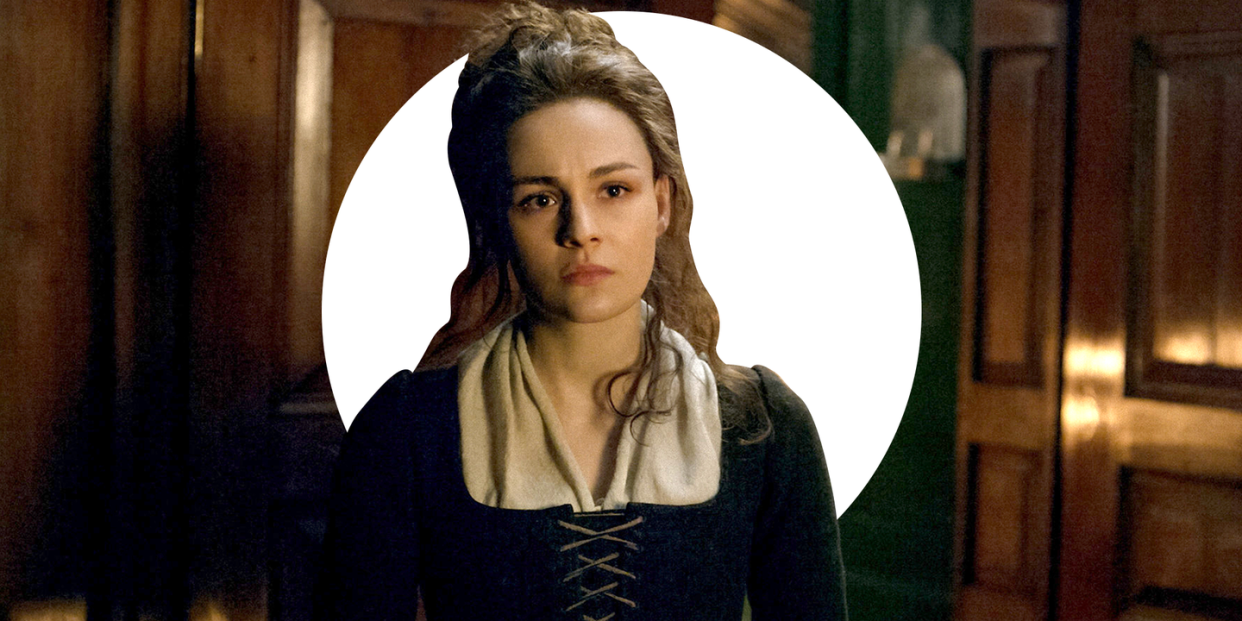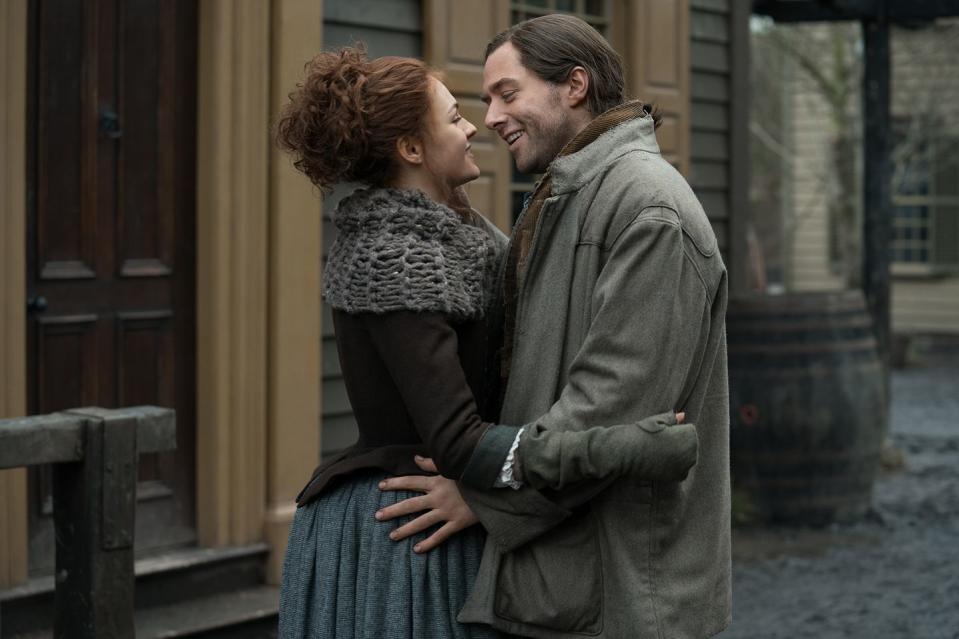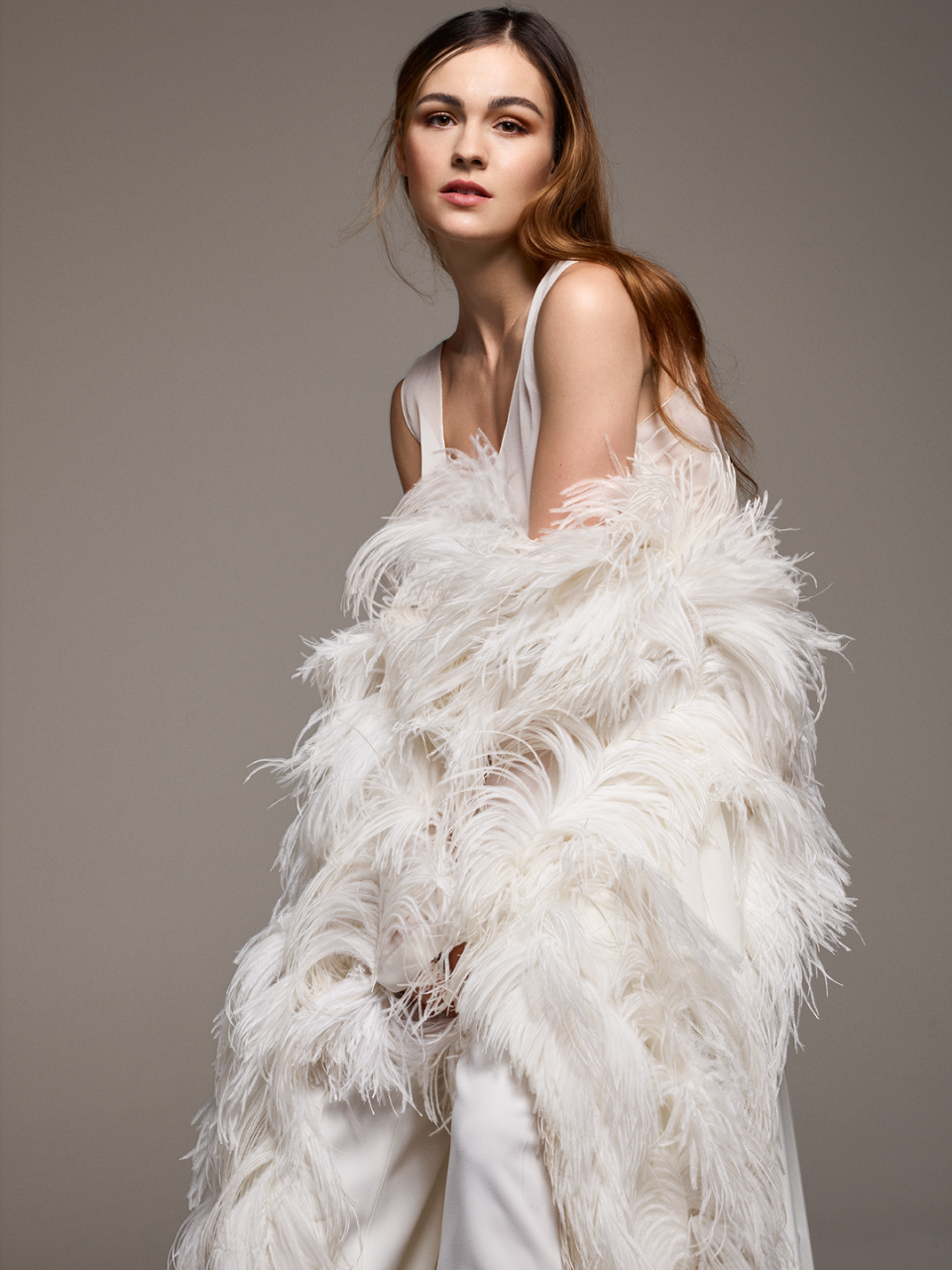Sophie Skelton Breaks Down Brianna's Harrowing 'Outlander' Episode

Warning: This article features an in-depth discussion about sexual abuse. Reader discretion is advised.
This season of Outlander marks the arrival of Brianna Randall Fraser (Sophie Skelton) as a fully fleshed-out character. She's not simply "Claire's daughter" anymore, as last week's standout episode-focusing on Bree's entry to the 18th century and signifying the first episode in the series in which neither Claire (Caitriona Balfe) nor Jamie (Sam Heughan) appear onscreen-proved. But Brianna's trip through the stones comes with more surprises-both joyous and horrifying-than she expected, and tonight's episode, "Wilmington," marks one of the highest and lowest points in her life.
The episode begins with a lot of hope for the future. Brianna came to terms with the legacy of her adopted father, Frank, in last week's episode, and this week lands in the colonies focused on finding her parents, meeting her biological father for the first time, and warning them of the news of their potential deaths. But Roger's appearance in Wilmington puts her plans on hold, and Bree, overjoyed to see him, agrees to a marriage pact. They sleep together, but the honeymoon phase is over before it begins after Brianna realizes Roger knew about her parents' fates and didn't tell her. She declares she never wants to see him again and he leaves, furious. This is troubling, of course, but not necessarily a sign that their relationship is over. As Skelton herself points out, Bree and Roger are not Claire and Jamie. "[Their relationship is] a lot more real in some ways," she tells BAZAAR.com. "Their communication's terrible. They argue all the time. It's like, oh, those relationships," she says.

Still, Brianna's in a bad place when she returns to the tavern where she's staying and discovers Stephen Bonnet-a stranger to her-gambling with her mother's wedding ring. Assuming she can buy it from him, Bree follows Bonnet to a back room. There, he violently attacks and rapes her. Outlander is based on a book series that features multiple instances of rape, and the show has received both praise and criticism for its depictions in past seasons. This time, the show chooses to literally close the doors on the attack itself, instead focusing on the tavern patrons' indifference to (and in some cases, bemusement at) Brianna's screams and cries from the back. It's a harrowing scene that underscores the ever-present dangers of life as a woman in the 18th century without feeling exploitative. As executive producer Maril Davis told The Hollywood Reporter of this plot point, "We're not trying to ever be gratuitous. We're trying to depict things as they really happened in that time."
For her part, Skelton spent a lot of time preparing for this scene and its aftermath. "If you see a character go through something, and see them come out the other end, not unharmed, but okay, then it gives you hope that you'll be able to do that, too," she says. Read on for more from Skelton about working on tonight's episode.
HB: You've said several times in the lead-up to tonight's episode that you wanted to do justice to real-life rape survivors. What did that look like for you? What sort of research did you do, and have you heard anything from readers who know what's coming in this episode?
SS: I've had a few real-life fans of the books come up to me and say they are petrified to watch that episode. They obviously didn't go into depth about what they've been through, but said they've been through similar things. It's heartbreaking that people, A) have been through it, and B) feel that way. One thing that's wonderful about movies and TV shows is that you get to know these characters, and you get to be in their head, and in a way, they help you through your real life. If you see a character go through something, and see them come out the other end, not unharmed, but okay, then it gives you hope that you'll be able to do that, too.
One thing with Bree I wanted to make sure [we showed] is that PTSD after rape doesn't go away. She's not hiding it so well. She's putting on this brave face when she meets her family; at the dinner table, you can see that all she wants to do is run to her room and be by herself, to not have to put on this facade. Little things [too], like when Bree walks into the tavern the morning after the rape, she flinches from people. I wanted to add that in to show all these different ways [the trauma] can affect people.
I watched a lot of interviews of women who'd been raped. I watched a lot of court cases where they confronted their rapist. I read a lot of interviews, and one that really stuck with me was this girl who said she felt like she wanted to peel her skin off her body, that she didn't belong in her own skin anymore and she wanted out. That's something I always kept in my head when playing Bree.
We actually did film the whole rape scene, but in the end they decided to have it behind closed doors. In my research, I found something out which I didn't really know about: A victim response called tonic immobility, which happens to a lot of women when they get raped. Their bodes go black on them and they go completely numb, so they don't feel anything during the rape. They're not in the room. When Bree's coming to after the rape, she's shaking and her nerves are kicking back in, and she starts to feel the effects of what she's just been through. And apparently, women who have that tonic immobility response then experience worse PTSD later because they go through the trauma afterwards. I wanted that to be very apparent when Bree says to Jamie, "Why didn't I fight?" I wanted to say, "Bree, it's not your fault. You didn't not fight hard enough. Your body copped out on you. You went blank." Her eyes glazed over, and she was numb.
HB: The show has seen some backlash surrounding its depiction of rape in seasons past. How did you feel about the decision to close the doors on Bree's rape?
SS: As an actress, you're gutted because you've put all the work into it. I wanted women to see Bree go through the whole thing. I feel like if an audience goes through [something with] a character from beginning to end, then they can really feel the effects of the ending, the effects of where we get to. Also I do feel like when people hear about someone being raped, it's very easy to say, "I would've fought harder." I think a lot of people aren't aware of this tonic immobility effect, and I feel like it would've been a very important thing to actually see that happen to Bree.
But at the same time, as a person, and in the current climate, I see that the writers made a very sensitive decision. Like you said, there's been mention of a lot of rape in the show. But I think currently, in this climate with #MeToo and everything else, and the fact that rape has been more prominent in shows like The Handmaid's Tale, [the producers] wanted to make sure they're not having it out there too much. I do feel like Outlander has always been very sensitive to it. It's never just someone's rape and then that's it, turn the page. You always go through the PTSD with the character, like with Jamie [in Season 1]. I feel like [the show does] it in a way that respects the victims. As I always say, it's one of those things that in those times, unfortunately, was very prominent. It happened, and it was kind of accepted that it happened. They couldn't remove Brianna's story, the rape, completely, because the rest of the season falls on it.
Harper's BAZAAR: This episode has a lot of whiplash moments for Brianna. At the start, she's still essentially a kid. Then she's unexpectedly marrying the man she loves, then she finds out he betrayed her and they have a terrible fight. On top of all that, she's brutally attacked. That's a lot to take in in in 53 minutes.
Sophie Skelton: She does come across as a kid. It's a good start we saw in Episode 7-we really see how broken she is from these experiences with Frank. When she and Roger have that argument, it's similar to later in the season when she and Jamie have an argument. It's not so much what they've done. It's the way they talk to her about it. The fact that Roger throws Brianna's last meeting with Frank [in her face], and when Jamie throws about Brianna lying about the rape, it's more the words that cut so deep. It's almost insulting her personality in a way. Bree feels like so many people have left her in her life, and that's why she struggles to let people in. She's starting to do that now, and then she feels betrayed by these people. She goes through so much in 53 minutes. She sees the high of her life-gets married, loses her virginity, all these huge landmarks in your life, and then it goes a complete 180 and she has the worst night of her life. It's a bit of a rollercoaster.
HB: Bree gets a lot of mixed reviews from fans of the show. What do you think it is about Brianna that makes her so divisive a character?
SS: Bree in a way is a younger version of Claire, but I also think she brings a kind of masculinity in too, in that she's a very strong, modern woman, but she also has these very Fraser-like, Jamie-esque qualities, and I think that brings another version of a female character in. I feel like she's a good mix between her parents, too. She's very hotheaded, very stubborn like Claire, but she is also very loyal like Claire. She's also very calculated as well, and Claire can often get into bad situations because she dives straight in. But I feel like Bree's a little bit more logical in some ways.
I'm excited to [see] the younger audience Brianna's gonna bring in. I've had a few messages from girls relating to Brianna, and not [necessarily about] all the difficulties Bree goes through. Obviously, this season she really is put through the ringer, but I do feel like young people can start to relate to Brianna as an individual.

HB: How did it feel to be the focal point of an entire episode, in last week's "Down the Rabbit Hole"?
SS: We've had a slow introduction to Bree for the last couple of years, so I was ready to have the material to really get my teeth into, to show more aspects of Bree's personality and have her in this completely different situation. Season 4 is my favorite. In terms of Bree's character, it's the one I signed up for. I've been waiting to do it for a while. [With Tobias Menzies, who plays Frank] I only had that really short flashback birthday scene with him, at Brianna's sixteenth birthday in Season 3. He's so great to bounce off. He and Cait have very similar styles. They're just so in the moment in the scene. It felt like a proper introduction to the show. To have a few scenes with Tobias, it's like, "This is Outlander, now."
This interview has been edited and condensed for clarity.
Outlander airs Sundays at 8 p.m. EST on Starz.
('You Might Also Like',)